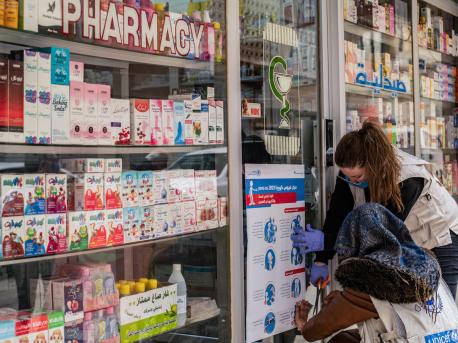
Getting the Word Out in Syria: How to Stop the Spread of Coronavirus
As of May 15, 2020, there have been just 48 confirmed cases of COVID-19 in Syria, with 3 reported deaths, according to the World Health Organization. The civil war, now in its tenth year, has left 11 million people in need of humanitarian assistance. An outbreak of the novel coronavirus is a crisis on top of a crisis, straining the country's already fragile health care system.
A public health campaign organized by UNICEF and partners is blanketing neighborhoods in Syria with reliable advice on how to prevent the spread of the potentially fatal virus. UNICEF volunteers are placing educational posters — with instructions on proper handwashing technique, how to greet people safely (no touching!) and how to spot COVID-19 symptoms — in pharmacies, supermarkets, clinics and street corners. Even bread bags are being pressed into service to make sure everyone gets the practical information they need to stay healthy during the pandemic.

Above, UNICEF volunteers hang a poster outside a pharmacy in Qamishly, a city of 250,000 in northeastern Syria. The posters contain information on how to cough into your elbow, when to seek medical assistance, and how to care for someone exhibiting symptoms. Jirjus, 20, (in yellow shirt) says, “Along with information on preventive measures, we also advise people on trustworthy sources of information, including UNICEF and WHO.”

Loris, 25, hangs a poster in a shop window. “Greetings by handshake or kisses on the cheek are very common in our community," she says. "Many people still do not know how dangerous that might be. It’s our responsibility to give them guidance on how they can protect themselves and their children."

UNICEF and partners launched the awareness-raising campaign across cities in Hassakeh and Raqqa governorates in northeast Syria, and in Aleppo governate in the northwest, with the support of a generous contribution from the Swedish government.

The posters make it easy for everyone to learn best handwashing practices: Using soap and water, wash every part of hands thoroughly for at least 20 seconds. Repeat often.

Fatima, a 23-year-old nurse, (left) tapes an educational poster to the wall of a clinic in Qamishly. ,“We have seen a spread of rumors and false information on COVID-19, including on ways of prevention," she says. "This campaign is essential in giving children and families informed instructions on how to best protect themselves.”

To reach as many people as possible in the governate of Aleppo, UNICEF and partners are placing more than 200,000 stickers on bread bags and putting up over 25,000 posters at pharmacies, grocery store and clinics in the city of Aleppo and its suburbs.

Mohammad, 11, holds a bread bag labeled with instructions on how to stay safe from the novel coronavirus, in the al-Zebdieh neighborhood of Aleppo. Pasting the information on every bread bag ensures that it will reach every household.
UNICEF and partners are also broadcasting audio messages and putting up posters in five camps and collective shelters hosting over 8,000 displaced people in Aleppo, to help protect children and families against the novel coronavirus.
Help UNICEF be there for vulnerable children around the world. Your support is urgently needed.
Top photo: On April 1, 2020, in Qamishly, Syria, UNICEF volunteers hang a poster providing important instructions on how families can protect themselves from the novel coronavirus. © Photos by Delil Souleiman for UNICEF
HOW TO HELP
There are many ways to make a difference
War, famine, poverty, natural disasters — threats to the world's children keep coming. But UNICEF won't stop working to keep children healthy and safe.
UNICEF works in over 190 countries and territories — more places than any other children's organization. UNICEF has the world's largest humanitarian warehouse and, when disaster strikes, can get supplies almost anywhere within 72 hours. Constantly innovating, always advocating for a better world for children, UNICEF works to ensure that every child can grow up healthy, educated, protected and respected.
Would you like to help give all children the opportunity to reach their full potential? There are many ways to get involved.





